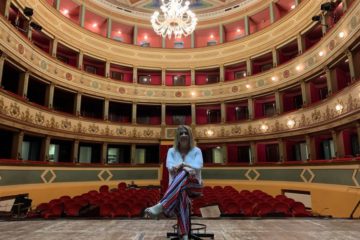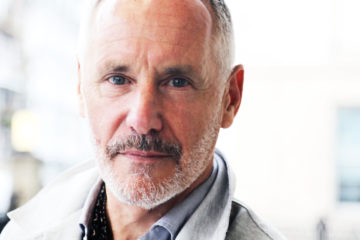American tenor Lawrence Brownlee is a renowned interpreter of many of the great bel canto roles, but he is doing equally important work off the stage as well: currently serving as an artistic advisor to Opera Philadelphia, Brownlee is working toward bringing more diversity to the world of opera. I am grateful that Lawrence was willing to take some time to answer a few of my questions about his experience singing Arturo in Lyric Opera of Chicago’s I puritani, his upcoming song cycle Cycles of My Being, and his passions outside of opera.
I just had the opportunity to see you perform live for the first time in I puritani in Chicago. First off, beautifully done! There are some high notes for you in that score! Is there anything else that’s particularly challenging about Arturo that audience members don’t often consider or notice?
Yes, people know that I have the high notes in the opera, but more than that, it’s the high-lying tessitura that’s hard. So this is different than just popping off these high Cs, high Ds, and of course the infamous high F; the area of the voice where most of the role lies is what makes it difficult. Also, another challenging thing is singing the finale of Act I, and then not being involved with any of Act II. When combined with the intermissions, I am offstage for about one hour and forty minutes. I have to stay fresh and vocally warmed up during the long break, because when I come back on stage for Act III, I am singing nonstop for the entire third act, so that makes it a challenging role for me.

Lawrence Brownlee as Arturo in Lyric Opera of Chicago’s I puritani
Photo credit: Todd Rosenberg
You get all of Act II off. I’ve always wondered, what do opera singers do backstage when they’ve got such a long break? Two intermissions and a 45-minute act is a pretty substantial amount of time.
I just relax a bit and occasionally do some vocal exercises so that my voice doesn’t go completely to sleep. I mainly try to stay physically awake, and engaged, and to feel like even though I’m not on stage, I’m a part of the story. I don’t turn myself off, I’m just not onstage. I’m actively feeling like I’m a part of what’s going on onstage, so that when I get back onstage for Act III, I don’t have to start from zero: I’m already engaged in what’s going on.
Do you have a favorite moment in Puritani?
Probably the duet in Act III with Elvira; I think it’s some of the most memorable singing and writing in the opera. When we sing the high Cs and high Ds at the end together, for me, it’s a thrilling moment.
You’re a bel canto specialist. How would you rank the three great bel canto composers: Rossini, Bellini, and Donizetti?
I can’t really rank them because I think they all have their differences, and of course all three of their music is still around today, being performed regularly in all the world’s most important theaters. Rossini of course is known for the coloratura, the fioritura, the fast moving notes, and the great ensemble writing. Donizetti is known for his beautiful legato lines. And to me, there’s something about the music of Bellini that is just exquisitely beautiful. When you think of Norma, Puritani, Il pirata; there are just so many beautiful and memorable melodies. The roles have high-lying tessituras and it can be difficult to cast these roles. That is how I would compare them, but I love all three of them and I’m happy to have all three of them as a part of my regular repertoire.
Tell us about Cycles of My Being. The world premiere is just around the corner!
Cycles of My Being is a song cycle that talks about the experience of being a black man in America. It was composed by a young African American composer Tyshawn Sorey with lyrics by Terrance Hayes, also a young African American. We’ve come together with our collective backgrounds and experiences to present something that gives a pulse on what we feel and some of the questions we ask. It’s about how we view living in this country in this skin, and how we are viewed by others.

Lawrence Brownlee
Photo credit: Shervin Lainez
We’ve come together with our collective backgrounds and experiences to present something that gives a pulse on what we feel and some of the questions we ask. It’s about how we view living in this country in this skin, and how we are viewed by others.
You are an artistic advisor to Opera Philadelphia, and are charged with bringing diversity to opera in this role. What are the greatest obstacles people of color face in “making it” in the too-often insular world of opera?
I think stripping away the stigmas is really important. The idea that it’s not for us, that it’s not for everyone, that it’s not interesting, that it’s only enjoyable for a certain type of person: these are some of the challenges that I deal with. As an artist that hopefully people can relate to, I aim to change people’s ideas, so they can open their minds and let the art form do the talking itself. I am fortunate to get to do this at a high level, so I continue to go and recruit people, and encourage and inspire them by what I’m doing onstage.
I feel that opera is finally making some significant improvements in diversity; I have no figures to backup my claim, but I feel as though I see more minority groups represented at leading companies than ever before. Are you under the same impression? Or am I way off base?
I think so, yes. I think you’re starting to see it and I think of course that we are becoming a more diverse society in general, little by little. I would like to see more equality, more opportunity, more access, and more education across the board, but I feel like there’s a move happening where people of color are not only on the stage, but in administration, in the audience, and in the support staff. It is very exciting to know that that’s happening and to see it.
Besides opera, what are you passionate about? How do you typically spend your Saturday nights when you’re not on the great stages of the world?
I have my passions: I love tennis and table tennis, salsa dancing, photography and I engage in the passions of my life. Whenever I’m on the road, I always try to make being on the road like being at home, and I do look for those things that bring me pleasure. So on a Saturday night I could be doing anything from going to see a movie, playing tennis, going salsa dancing, or doing something else that I find pleasurable.
To finish, I’d like to ask a question I ask everyone: what is it about opera that touches your soul?
Opera for me is special: it’s the combination of acting, singing, and emotion. It can transport you into a different world. I think the thing about it is that if you can understand human relationships, if you understand love, if you understand betrayal, if you understand pain, if you understand suffering, opera can tell the story in a way that no other art form can. And these composers have created these atmospheres where the music makes you feel the pain, or makes you feel the worry. The music creates the emotion and you as a singer can expound and express upon that along with the beauty of your voice. All of the elements of the fine arts combine together in opera.


